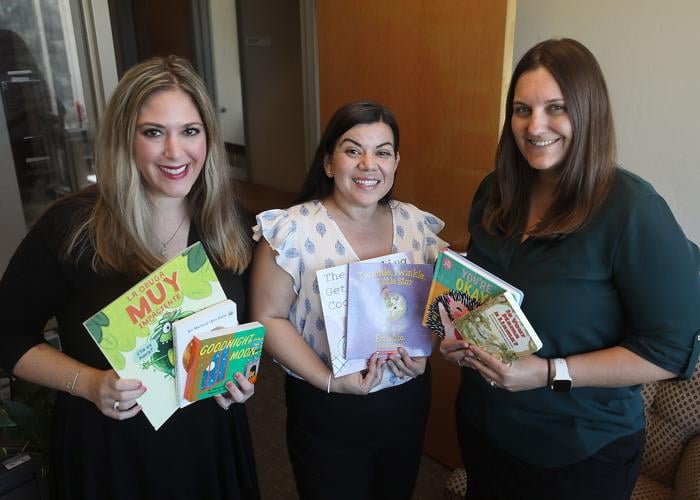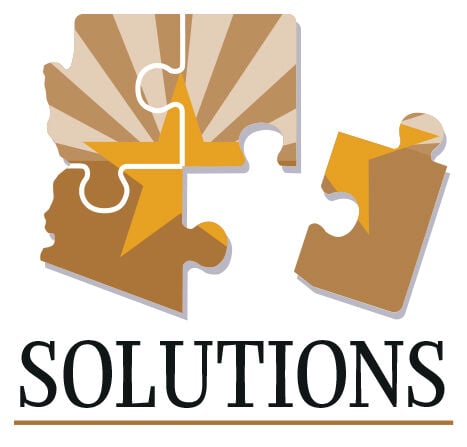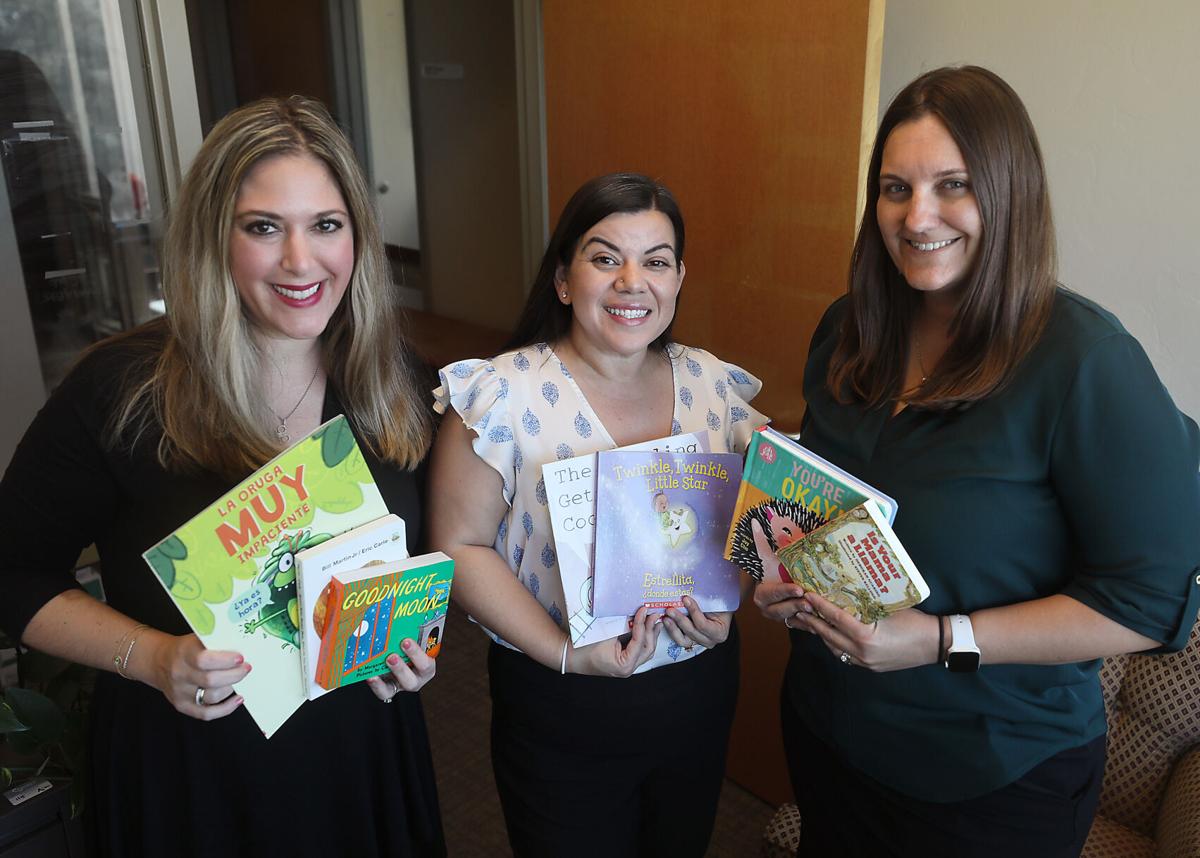A new program offered in Pima County Juvenile Court hopes to promote bonding between parents and their children who are in state care, while also supporting child literacy efforts.
Reading 2Gether is open to kids from birth through 5 years old, and the time commitment for parents is minimal: two 15-minute phone calls per week.
But in that short time, parents can help enhance their child's language and literacy development, engage in meaningful exchanges and increase their child's sense of trust in them with predictable, consistent interactions.
Participants receive a Reading 2Gether tote bag with books in the family's language. Parents and children receive the same two books in their bags but the contents differ from there.
The bag that goes home with the child has information about how to set up a Google phone number in case the temporary family would like to keep their personal phone number private.
The bag that goes home with the parent also includes a blanket. Parents are asked to sleep with the blanket for a few nights, and abstain from cigarettes, marijuana and anything that could be dangerous to their child.
"There's tons of research that says that bonding and attachment are a multisense process," said Juvenile Court Judge Joan Wagener. "How do you do that when the parent lives in one house and the baby lives in another house? You do it with this program."
At least twice a week, the biological parent and the caregiver will get in touch via phone or online. The child will snuggle up with the blanket that spent time with their parent, and follow along with their copy of the book as Mom or Dad reads to them over the phone.
"Their auditory system, their olfactory system and their visual system is all playing at the same time," Wagener said. "It's a really inventive way of pulling all those things together so you increase the chances that bonding and attachment happen."

Hundreds of books
Reading 2Gether is a collaboration between the court, Pima County Public Defense Services and the Arizona Department of Child Safety.
The program was launched last month and aims to encourage early reading interactions between parent and child during the journey leading up to reunification or final placement.
The program is funded by the county's public defense services, which house the Office of Children's Counsel, whose attorneys represent minors in various court cases, including family law and guardianship issues.
Most dependency cases in juvenile court are eligible for Reading 2Gether. The exception is if there's criminal conduct involved in the case or a no-contact order between the parent and child.
The dependency process is for families who are involved with the Department of Child Safety after a child has been removed from the home.
Reading 2Gether is open to licensed foster families or to kinship providers, who are relatives. Parents in prison or jail are also eligible, if the facility where they are incarcerated allows for participation.
Pima County is now the second site in Arizona to have this type of program and is among a handful in the country.

The program was inspired by Iowa Court's Safe Babies Court Team's 2-4-2 Program, which Wagener learned about in 2018 during an annual courts meeting.
Wagener brought the idea back to Pima County's Building Blocks Committee, a group of local court-based, legal and agency stakeholders working to address the needs of children and families involved with the juvenile dependency court and child welfare system.
"We fell in love with this program and we wanted to get it up and running here in Pima County," Wagener said.
Funding for the program eventually fell into place, partly because Jillian Aja, assistant chief counsel at Pima County Office of Children's Counsel, wrote a grant proposal.
For the books to use in Reading 2Gether, Aja collected suggestions from co-workers and others, then went through the Scholastic catalog, checking off titles.
"It was like living out my best childhood fantasy," Aja said. "And when (Scholastic) realized this was a kid-related thing … we ended up with a lot of extra books."
With more than 500 books filling up a cubicle in Aja's office, Reading 2Gether was finally ready to launch last month. The blankets are provided by Aviva Children's Services and funding for the bags and books came from a COVID-related grant awarded to the county's legal defense services.
"We want to get you home"
Reading 2Gether operates on the honor system, as organizers didn't want it to be a burdensome process. But they are surveying parents, placement families and DCS about their thoughts on the program and if they thought it affected the reunification system.
"If the court or whoever decides they want to expand it to something else, we'll have lessons learned," Wagener said.
Stephanie Rascher, a local attorney who represents parents in dependency cases, said this type of program that focuses on bonding without putting anything extra on parents' plates is especially important.
For some, "They're running from drug testing to parenting education to myriad of services that DCS is asking them to do, which can be really stressful and discouraging to them," Rascher said. "One of the highlights of this program is it's not asking too much."
Families can keep the books that come in their bags, or they're welcome to bring them back and swap them out for new books.
DCS case managers and attorneys with the Office of Children's Counsel refer families for participation in Reading 2Gether, with community coordinator Tasha Gamez taking all referrals and distributing bags to the families.
"Part of the goal of this project is to encourage collaboration between the placements and the bio(logical) parents toward reunification," Rascher said. "Because really it takes a village to get to reunification."
Two factors that heavily influence a successful reunification are the amount of contact the parents and children have and support by the foster parent or kinship provider, Wagener said.
She said building a support system that's not tied to the system increases the chances that a family will not come back through the system.
"Ultimately, that's what we want. We want to get you home and that's it," she said. "And this is a strategy that will help if those relationships are built."
Reading 2Gether can also help biological parents learn new skills, with foster parents being able to model interactions for parents that may have never parented a child or weren't with their child long enough to establish knowledge, said Maria Colón, CASA program coordinator.
"If they're interacting with these placements and foster parents, they're seeing even how their baby likes to be held and the activities their child likes to do," Colón said. "That can help them in the reunification process."
For biological parents who have never had a positive parenting role model in their own lives, programs like Reading 2Gether can sometimes provide just that, with foster parents serving as that figure, Wagener said.
"That role model doesn't have to be biological," Wagener said. "That's what's so beautiful about this process. If you get the right people together, you end up with this beautiful outcome."
"A great ice-breaker"
Nancy Boccardo has been a foster parent for close to 17 years. She's had 65 "kiddos" come through her home and most of them ended up back with their biological parents, thanks to the approach of Nancy and her husband.
"We get ourselves as involved as we can with the whole family," Boccardo said. "Sometimes it's not safe and doesn't work out that way, but most of the time it's doable."
Boccardo and her husband have adopted eight of the 65 kids that have come through their care. Two were adopted by their friends, and the rest have gone home to their parents. She said that while her reunification numbers are better than the state average, it shows that her approach works.
"If you have a newborn taken away and two years later you get a toddler back, you don't know anything about them," Boccardo said. "You haven't been going to doctor's appointments or anything outside of your visits. You don't know who you're getting back."
That's why programs like Reading 2Gether are so important, she said. When a person gets their child taken away, the initial interactions with foster parents can sometimes be adversarial.
"When we go to the first meeting with a kiddo's parents, we're automatically the enemy because we have their kid," she said. "This kind of program is a great ice-breaker for families that need it."
Boccardo said that she's enjoyed long-term relationships with many of her former foster children's families, providing after-school child care for one and filling in as a caretaker during emergencies for others.
"Our family has grown bigger than I can even tell you," she said.
"Gives them the ability to bond"
If the program goes well, organizers will consider expanding it to older children, but for now, the focus is on early childhood development.
One of the upsides to the younger age group is that reading proficiency isn't a barrier for parents.
"You don't have to be able to read at all to be involved in Reading 2Gether," Wagener said. "You can sing with your baby. You can use that book and show the picture and tell your own story. Just talking to your child will increase their vocabulary, attention span and school readiness."
The language a family speaks is also not a barrier, with a cache of books available in Spanish and other languages. The workgroup also has a partner who has committed to providing books in any languages that aren't already on hand.
Even if the child is not reunited with their biological parent, studies have shown that bonding with a birth parent is good for children in the short- and long-run, said CASA's Colón.
"That gives them the ability to bond and attach with another adult in their life," Colón said.
Studies have shown that secure attachment forms the basis of future relationships, a child's sense of self-worth, ability to regulate emotions and more, according to the Tennessee Governor's Early Literacy Foundation.
The program can't be built into the court's budget, so Reading 2Gether will have to find other ways to carry on, either through DCS funding or the county. For now, the Pima County Library is accepting donations on its website, but Wagener isn't worried the program will go away anytime soon.
"I just believe that when you put something in the universe, the universe makes it happen. It just seems that needs get fulfilled," Wagener said. "My hope is that this program stays regardless of if any of us are here or not."
"Who can say no to building a brain?"






